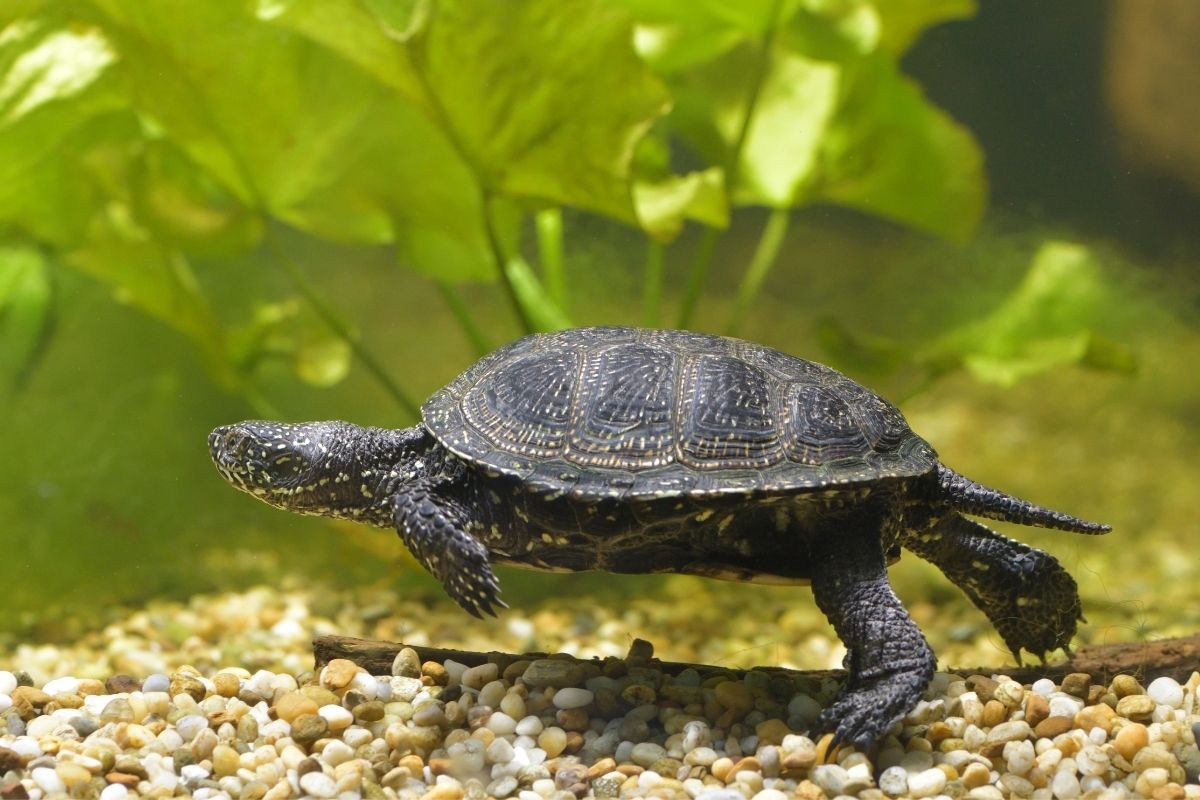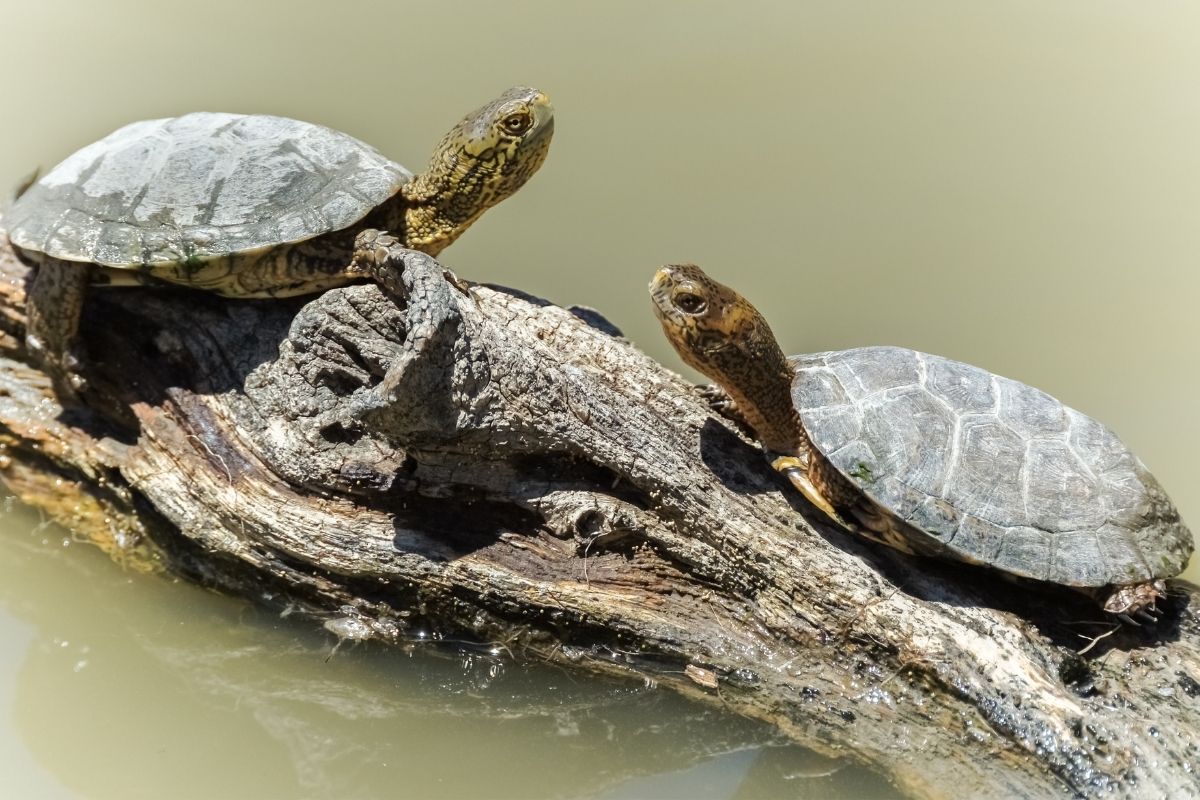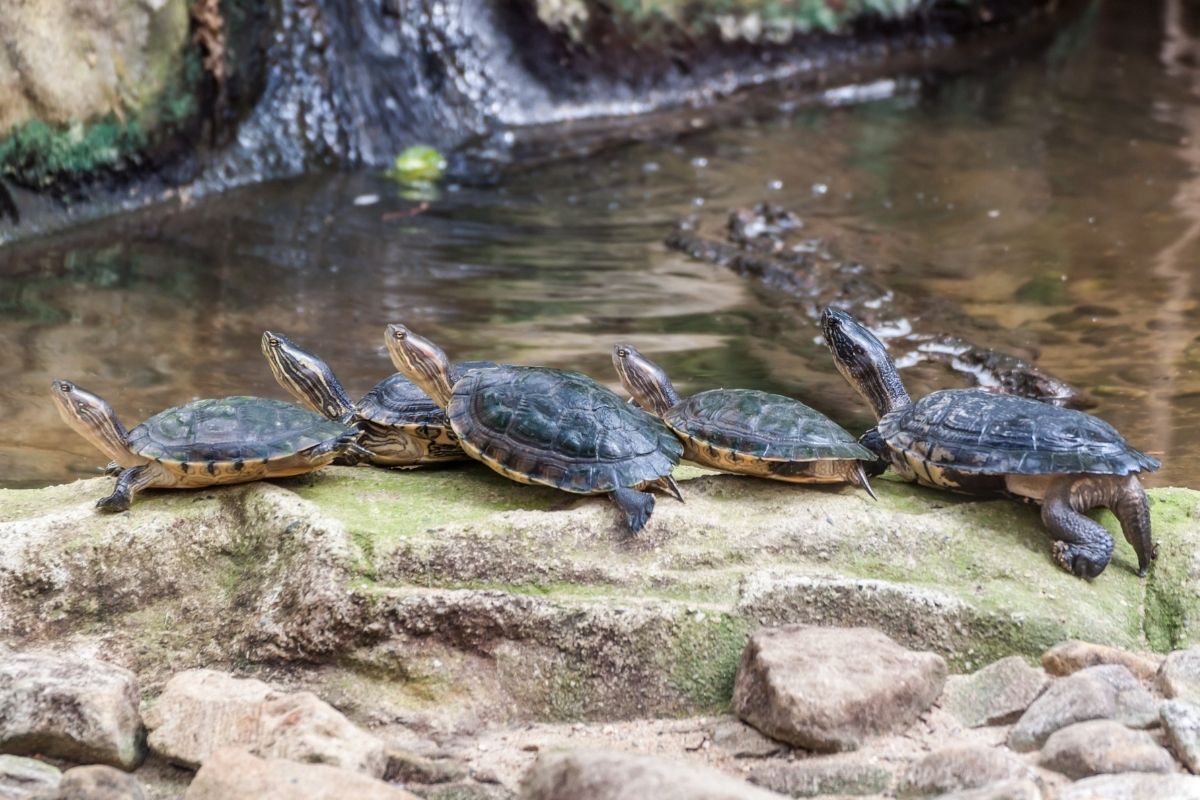Pond turtles are some of the most beautiful creatures around. They are also very sensitive to their environment and require specific care. If you want to raise them successfully, you should know what they eat.

Turtles are reptiles belonging to the order Testudines. There are over 300 species of turtle, and each has its own unique characteristics.
The most common types include tortoises, terrapins, box turtles, and snapping turtles.
You can feed your pond turtle a variety of foods, such as fish, crickets, worms, insects, and even fruits and vegetables.
However, you should always remember that these animals are omnivores, which means they will need some protein in their diet.
The article below has gathered some important information concerning turtles and what you should feed them in their ponds.
So if you want to keep your reptilian friend happy, this article has everything you need to get started.
What Are Pond Turtles?
Pond turtle sliders (otherwise known as Trachemys scripta elegans) are one of the most popular aquatic pets for both children and adults alike.
These small, colorful amphibians are native to North America, where they live in freshwater wetlands throughout the United States and northern Mexico.
These adorable little guys are not only fun to watch but also make great pets. In fact, many people consider them to be more entertaining than other pet options because they are so active and inquisitive.
They are also quite easy to take care of and do not require much maintenance. However, you have to be mindful of what you feed them.
As mentioned earlier, they are omnivorous and will eat just about anything that is available. This includes plants, insects, crustaceans, small fish and even vegetables.
While this species is not endangered, it does face certain threats from predators like raccoons and snakes. Therefore, you must ensure that your pond turtle habitat is safe by keeping it free of any potential hazards.
It is also important to note that the FDA bans the purchase of turtle eggs in certain states, as the creatures are known to aid in the spread of salmonella.
For this reason, we recommend washing your hands after handling both domestic and wild turtles.
What To Feed Pond Turtles?
Pellets are an excellent source of nutrition for your pond turtles. You can buy them at almost any pet store or online retailer.
They come in a wide range of shapes and sizes, including regular pellets, soft-shelled ones, and hard-shelled ones.
The best thing about pellet food is that it is highly digestible. It contains high levels of vitamins and minerals, making it ideal for all kinds of reptiles. Pellets are also easy to prepare and clean up.
When feeding your turtle pellets, you will need to place them in the water. You should never attempt to feed your turtle by hand.
Pellets count as 25% of your pond turtle’s diet, which means the rest of their diet should include some of the following suggestions:
Live Food
- Mealworms
- Earthworms
- Crickets
- Waxworms
- Silkworms
- Aquatic snails
- Bloodworms
- Daphnia
- Crabs
- Krill
Green Food
- Aquatic plants
- Collard greens
- Mustard greens
- Dandelions
- Kale
- Bok Choy
- Carrots
- Squash
- Green beans
What Are The Best Turtle Pellets?

The best turtle pellets are made with quality ingredients and contain no fillers or additives. While there are many products available, these are some of our favorites:
Reptomin Turtle Pellets
These pellets are bursting with nutrients and are perfect for your pond turtles. They are formulated specifically for reptiles and are 100% natural.
Reptomin makes sure that each ingredient has been carefully selected to meet the nutritional needs of your reptilian friend. You can learn more about this product here.
Mazuri Aquatic Turtle Food
This is another favorite among turtle enthusiasts. Mazuri produces high-quality pellets and mixes them with premium ingredients such as fresh fruit pieces, flake foods and vitamin supplements.
They are also very affordable and offer a variety of flavors. You can learn more about this product here.
It is important to remember that pond turtles are omnivores, which means they will eat a variety of animals and plants in the wild.
Red ear sliders also have similar dietary needs, so their diets should include some of the following:
- Mealworms
- Crickets
- Slugs
- Insects
- Waxworms
- Flies
- Crayfish
- Aquatic plants
- Tadpoles
- Fish
Pond turtles live in freshwater rivers and ponds and will eat anything that they can find in their natural habitat. However, if you want something more stable, you can purchase pre-planned turtle diets from your local pet store.
Do Different Turtles Have Different Tastes?
Yes! Although red ear slider turtles are often referred to as “turtle soup,” they actually prefer different types of food than other species of pond turtles.
Because of this, you should not be disheartened if your pond turtles do not take to your pre-planned diet, as these things take time and patience.
If your turtles are still not feeding after a few days, then you will need to consider a different food source for your adorable pets.
What To Avoid When Feeding Pond Turtles?

While pond turtles are not known to be picky, there are certain foods that need to be avoided when feeding these particular reptiles. These foods include:
Fast Food
You should never feed your turtle any oily or greasy foods. Oils and grease attract parasites and disease, which could make your turtles sick.
Dairy Products
Although it is possible to feed dairy products to your pond turtles, it is not recommended. Turtles don’t have the enzymes needed to digest lactose, which means eating dairy could result in stomach pain and digestive problems.
Chocolate & Candy
Many people think that chocolate and candy are healthy treats for their pets, but this isn’t true.
Chocolate contains caffeine and sugar, both of which can cause health issues in turtles. It’s best to avoid giving your turtles any type of sweet treat.
Beyond these foods, there are other things you should avoid doing when feeding and looking after your pond turtles.
Don’t Kiss Them
While it may be tempting to kiss your turtles from time to time, it is important to remember that the species carries salmonella and should be handled with caution.
Don’t Share Food
Since turtles are known carriers of salmonella, you should never share food with them. If you accidentally give your turtles food that has been shared with others, you run the risk of passing on bacteria to your little friends.
Always Wash Your Hands
When you have handled your turtle, you will need to wash your hands immediately afterward. This is because salmonella can survive up to three hours on moist surfaces such as skin, hair, and towels.
Conclusion
Feeding your pond turtles is an enjoyable experience, but it does require a bit of patience and planning.
Remember to keep them safe by avoiding the foods mentioned above, washing your hands after handling your turtles, and keeping them away from other certain animals.
